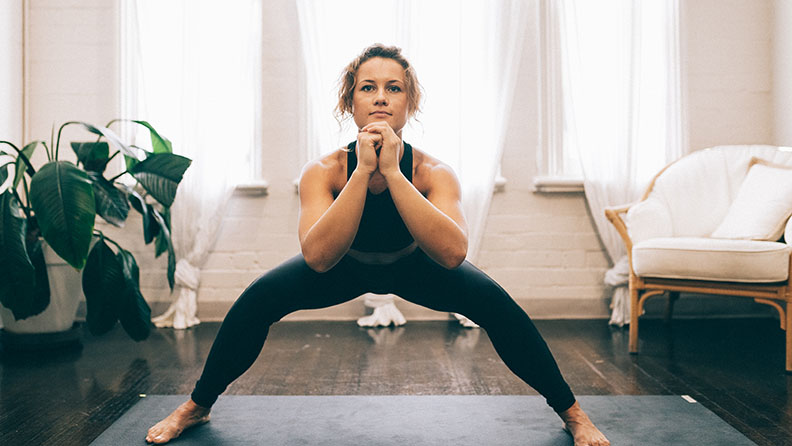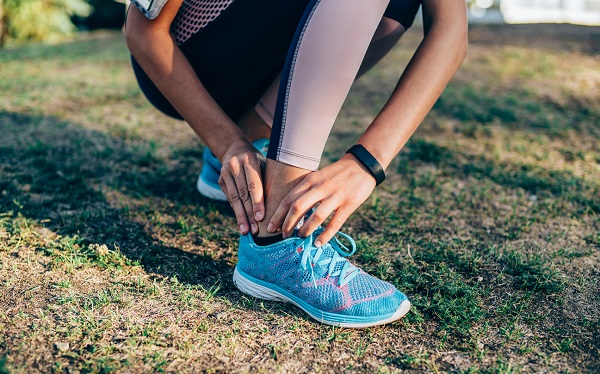-
Ever heard the one about abs being made in the kitchen? It’s a commonly held belief that diet plays a bigger role than exercise if you’re trying to lose weight. So would it be possible to lose weight through diet alone? Or does exercise play a more important role?
We spoke to Accredited Practising Dietitian Kate Gudorf, to get the skinny on how weight loss really works, and why there are benefits to exercise beyond just losing weight.
How does weight loss work - is it simply calories in minus calories out?
“At its most basic level, weight loss is an energy deficit. Which means that the calories we take in are less than the calories we burn throughout the day.
We burn calories in three different ways:
- The exercise that we do. That includes planned physical activity as well as the activities of daily life, like moving around, standing or walking.
- Our basal metabolic rate, which is the energy we use to fuel our body’s processes — so things like our heart beating, our lungs expanding and contracting, our brain using energy to think.
- The thermic effect of food, which is just a fancy term for metabolism. When we eat, our body uses energy to break down and metabolise the food.
So as long as we’re taking in less than we’re burning, in theory we will lose weight. But of course there are many other factors that can affect that balance."
In what ways is losing weight different for different people?
“This is where it really comes down to the individualised approach. For some people, they can just very easily alter the calories that they’re taking in, increase the calories that they burn and they go forward and they lose weight. But for other people, they might find that there could be a strong emotional component.
They might struggle with emotional eating, they might have certain triggers that cause them to overeat — for example they could have a very stressful day, and the way that they manage that is by turning to comfort foods. Or maybe people have a strong connection with sitting in front of a screen at night and eating, and eating more than what they need to consume.
For other people, they might just find that when they reduce the amount of calories they’re taking in, they feel it’s beginning to affect their quality of life. Because obviously food is connected to so much that we do, it’s connected culturally, it’s connected to our enjoyment and our social life, so for some people, that emotional connection with food can be really difficult to tame.”
READ MORE: Anxiety and overeating
How important is diet for losing weight?
“I’ve often heard people say that dieting is 80% of weight loss and exercise is 20%, and I think that’s a fairly accurate assessment. We know that we can really affect that energy balance through our energy intake, much more so than through energy output. To put that into perspective, a half-hour run might only burn 250 calories, but we might feel very, very spent afterwards. Whereas we can easily cut out one 300 calorie snack a day and not feel like we’re missing out.”
Do you really need exercise to lose weight?

-
Sign up to our weekly newsletter and receive useful health tips and insights, expert advice, offers and promotions straight to your inbox. Receive your FREE Mindfulness book and get the inside track to start you on your journey.
Is it possible to lose weight without doing any exercise?
“It is possible, but when we factor in exercise it really boosts the effect of weight loss, because we create a larger deficit between the energy out versus the energy in. So, if you cut out that one 300-calorie snack and maybe you add on an hour-long walk every day, now you create a much greater energy deficit.”
What advice do you have for people who want to lose weight?
“Small, sustainable changes are the best way to go forward. And that might be different for everyone. Think of some of the things you’re willing and able to change, and then build on that.
For some people, it might be looking at their habits around eating in front of a screen at night, and so maybe they’ll change that ‘mindless eating’ component. For some people, it might be cutting back on the calories they take in through alcohol. For others, it could be increasing their physical activity. Look at what some of the sustainable changes are that you can make, set some goals, and once you’ve achieved those goals, moving on to the next small, sustainable change.
We know that people are much more likely to sustain changes that are balanced rather than extreme, so a balanced approach to diet where you’re not cutting out large food groups or you’re not going into a bad style of eating — we know that those types of (balanced) changes are much more likely to be sustained over the long-term.
Rather than focusing on diet, focus on eating for health, exercising for health, for the benefits that your body receives rather than some sort of punishment. If you need help or assistance in doing any of those things, a dietician is your best source of information. Not only can they help you identify what those small changes might be, but they can also help you write an eating plan that takes into account your cultural background, your diet preferences, your energy needs, plus they can also be your champion and support you along the way. We know that contact with health professionals like a dietician along your weight loss journey will result in greater weight loss and you’re more likely to sustain or maintain those changes in the long term.”
READ MORE: How to eat mindfully
Why is it still important to exercise, even if you're losing weight through dietary changes?
“There are huge benefits to exercise! It really helps to keep your bones strong, especially if you’re going weight-bearing exercise. Exercise produces all these great ‘feel good’ hormones, so it improves your mood, it can help you sleep better at night, and generally contribute to an all-round sense of wellbeing. Which is an all around win.
There’s also social and psychological benefits, so if you’re doing team-based sports, there can be that social benefit of exercise thanks to interaction and building relationships with others. It can certainly help if you have Type 2 Diabetes or if you’re at risk of Type 2 Diabetes; exercise can really improve insulin resistance and improve blood glucose levels. Exercise can also reduce your risk of developing chronic disease. There are lot of health benefits to exercise, and it’s not just about weight loss.”
-
Stretches for gym enthusiasts
8 stretches to help you cool down from workouts
-
Stretches for office workers
Stretch out your back and relieve stress
-
Stretches for runners
Stretch your legs, hips and back after a long run
-
How to walk 10,000 steps
Discover how to easily reach your goal of 10,000 steps daily.
-
Everything you need to know about parkrun
Been wondering what a parkrun looks like? Where do you go? What do you do? How do you sign up? Find out here.
-
Five ways to exercise when on a budget
You don’t need to spend money on gym memberships just to meet your fitness goals. Here are five free ways to stay healthy and active when you’re living on a budget.
Subscribe to receive the best from Live Better every week. Healthy recipes, exercise tips and activities, offers and promotions – everything to help you eat, move and feel better.
By clicking sign up I understand and agree to Medibank's privacy policy






